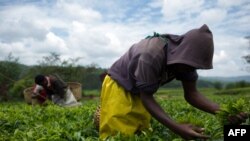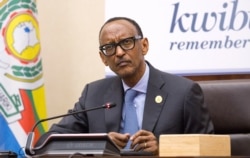In Rwanda, there is an ongoing debate over the authenticity of poverty statistics. The government says poverty has dropped dramatically, but people who are actually destitute, and their advocates, are skeptical.
Seventy-nine-year-old Rwandan Ananias Munyarubuga, who lost both his legs in a motorcycle accident, lives in utter poverty. The house he lives in is in very bad condition. He walks with great difficulty. He says to eat is not easy.
He says he sometimes spends more than three days without eating, waiting until someone brings him some food. He says poverty is overwhelming.
Munyarubuga still hopes for government assistance but cannot get the help he needs.
He says the authorities have told him that to get a house he needs to have a plot of land. But, he says, he doesn't have land and cannot get it. He says he is asking the government to build him a house so he can at least have shelter for his remaining days on Earth.
The Rwandan government says extreme poverty in the country dropped dramatically by 2017, to 34 percent of the population, compared to more than 60 percent in 2007.
But the London-based Financial Times newspaper reports the government has manipulated poverty statistics, allegedly to prop up Rwanda's president, Paul Kagame. Kagame has dismissed the report.
“I think it originates from stereotypes and prejudices that are always there that Africa cannot do fine, Africans have to do things which must be validated by others somewhere. But we don't need any validation. We want to do things that benefit us, that put us in a place where we want to be," Kagame was quoted as saying.
World Bank economist Aghassi Mkrtchyan acknowledges that Rwanda has made great strides since its 1994 genocide.
“For the last two decades the average growth is about 7% and it is quite broad-based so we see traditional sectors in Rwanda like agriculture and others growing at a quite strong pace, but also Rwanda has seen emergence of new sectors.”
But Mkrtchyan and others say the country still has a long way to go.
"Poverty reduction was relatively small between 2014-2017. And, as we recall, those were difficult years for Rwanda. Rwanda suffered enormous droughts in 2015 and 2016; there [were] also slowdowns in growth in those years."
Data show that an estimated 40 percent of Rwandans live on less than two dollars a day.





